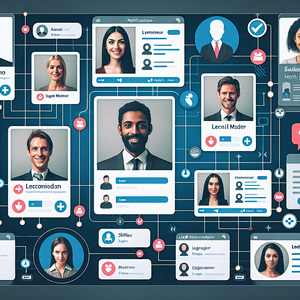Future-Proofing Your Career: How Google’s Innovations Are Shaping Job Markets

Artificial intelligence stands at the forefront of Google's innovations, with applications ranging from machine learning algorithms to natural language processing. These technologies are not only transforming organizational operations but also redefining the skill sets employees require to thrive. Roles demanding expertise in data analysis, algorithm design, and AI integration are becoming increasingly pivotal. Supporting Example: Consider the emergence of AI-driven tools such as Google Cloud’s AI Platform, which allows businesses to harness machine learning capabilities with minimal expertise in the field. This democratization of AI signifies that professionals across all sectors—from healthcare to finance—must cultivate a foundational understanding of AI technologies. Consequently, individuals who invest time in learning about AI and its applications are likely to find themselves in high demand. According to the World Economic Forum, AI is projected to create 133 million new roles by 2022, underscoring the necessity of AI literacy in today’s workforce.
The Importance of Cloud Computing
Google's advancements in cloud computing are another crucial facet of future-proofing careers. The shift towards cloud-based systems has revolutionized how organizations store, manage, and analyze data. Professionals equipped with cloud computing skills enable businesses to transition smoothly into this new digital landscape. Supporting Example: Google Cloud’s services, such as Google Workspace and BigQuery, are reshaping business operations. For instance, companies leveraging these tools can enhance collaboration, improve data accessibility, and drive informed decision-making. Job seekers proficient in cloud platforms are now highly sought after across various industries, making cloud expertise a vital skill in the modern job market. The rapid growth of the cloud computing market, expected to reach $832.1 billion by 2025, further emphasizes the necessity for professionals to acquire these skills to remain competitive.
Embracing Digital Skills
In addition to technical skills, Google underscores the importance of digital literacy as a fundamental competency in today's workplace. As businesses increasingly adopt digital tools for communication, project management, and data analysis, the ability to navigate these technologies becomes essential. Supporting Example: Initiatives like Google's Digital Garage and Grow with Google provide free resources and training programs designed to equip individuals with essential digital skills. By taking advantage of these programs, professionals can enhance their employability and adaptability, positioning themselves as valuable assets to potential employers. A report from the McKinsey Global Institute indicates that by 2030, up to 375 million workers may need to switch occupational categories due to automation, making digital skills a crucial element of career adaptability.
Adapting to Change: Lifelong Learning
As the job market continues to evolve, one of the most critical strategies for future-proofing one’s career is embracing a mindset of lifelong learning. Google’s commitment to innovation serves as a reminder that the skills in demand today may not suffice tomorrow. Professionals must proactively seek out new learning opportunities through formal education, online courses, or industry certifications. Supporting Example: Platforms like Coursera and Udacity, which partner with Google, offer courses on topics such as data science, AI, and cloud computing. Engaging with these platforms allows individuals to stay ahead of the curve and gain relevant, industry-recognized credentials that enhance their marketability. A survey by LinkedIn revealed that 94% of employees would stay at a company longer if it invested in their career development, highlighting the importance of continuous learning in employee retention and career advancement.
The landscape of the job market is shifting rapidly, driven by Google's innovations in AI, cloud computing, and digital skills. To remain competitive, professionals must recognize the importance of adapting to these changes by cultivating essential skills, embracing digital literacy, and committing to lifelong learning. By doing so, individuals not only future-proof their careers but also position themselves to thrive in a dynamic and ever-evolving workplace. Understanding the role of technology in shaping job markets is more crucial than ever for anyone looking to succeed. As we navigate this new era, staying informed and agile will be key to unlocking opportunities in the future job market.
AI/Machine Learning Engineer
Google, Amazon, Microsoft, startups
Core Responsibilities
Design and implement machine learning models to solve specific business problems.
Collaborate with data scientists and software engineers to integrate AI solutions into production environments.
Optimize algorithms for performance and scalability.
Required Skills
Proficiency in programming languages such as Python or Java, with experience in frameworks like TensorFlow or PyTorch.
Strong understanding of statistics, data structures, and algorithms.
Familiarity with cloud services (e.g., Google Cloud, AWS) to deploy AI solutions.
Cloud Solutions Architect
Google, AWS, large enterprises in finance and healthcare
Core Responsibilities
Design and manage scalable cloud architectures that meet organizational needs.
Collaborate with cross-functional teams to integrate cloud services into existing IT infrastructure.
Provide best practices for cloud security and cost management.
Required Skills
Expertise in cloud platforms (especially Google Cloud Platform, AWS, or Azure).
Knowledge of containerization technologies such as Docker and Kubernetes.
Certifications like Google Cloud Professional Cloud Architect or AWS Certified Solutions Architect are highly preferred.
Digital Marketing Specialist with SEO Focus
Digital marketing agencies, e-commerce companies, tech firms like Google or Facebook
Core Responsibilities
Develop and implement SEO strategies to increase organic traffic to websites.
Conduct keyword research and competitor analysis to identify growth opportunities.
Analyze website performance using tools such as Google Analytics and Search Console.
Required Skills
Strong understanding of SEO best practices and algorithms.
Proficiency in digital marketing tools like SEMrush, Ahrefs, or Moz.
Excellent analytical skills and the ability to interpret data to inform strategy.
Data Analyst in Cloud Environments
Companies across multiple sectors including finance, healthcare, tech firms utilizing cloud solutions
Core Responsibilities
Analyze large datasets stored in cloud-based platforms to derive actionable insights.
Create and maintain dashboards to visualize key metrics for stakeholders.
Collaborate with data engineers to ensure the accuracy and accessibility of data.
Required Skills
Proficiency in SQL, Python, or R for data manipulation and analysis.
Experience with cloud-based data tools such as Google BigQuery or AWS Redshift.
Familiarity with data visualization tools like Tableau or Google Data Studio.
UX/UI Designer for Digital Products
Tech companies like Google, Apple, various startups
Core Responsibilities
Conduct user research and testing to understand user needs and behaviors.
Design intuitive user interfaces and experiences for web and mobile applications.
Collaborate with developers and product managers to implement designs effectively.
Required Skills
Proficiency in design tools such as Sketch, Figma, or Adobe XD.
Strong understanding of user-centered design principles and accessibility standards.
Experience in creating wireframes, prototypes, and high-fidelity designs.


